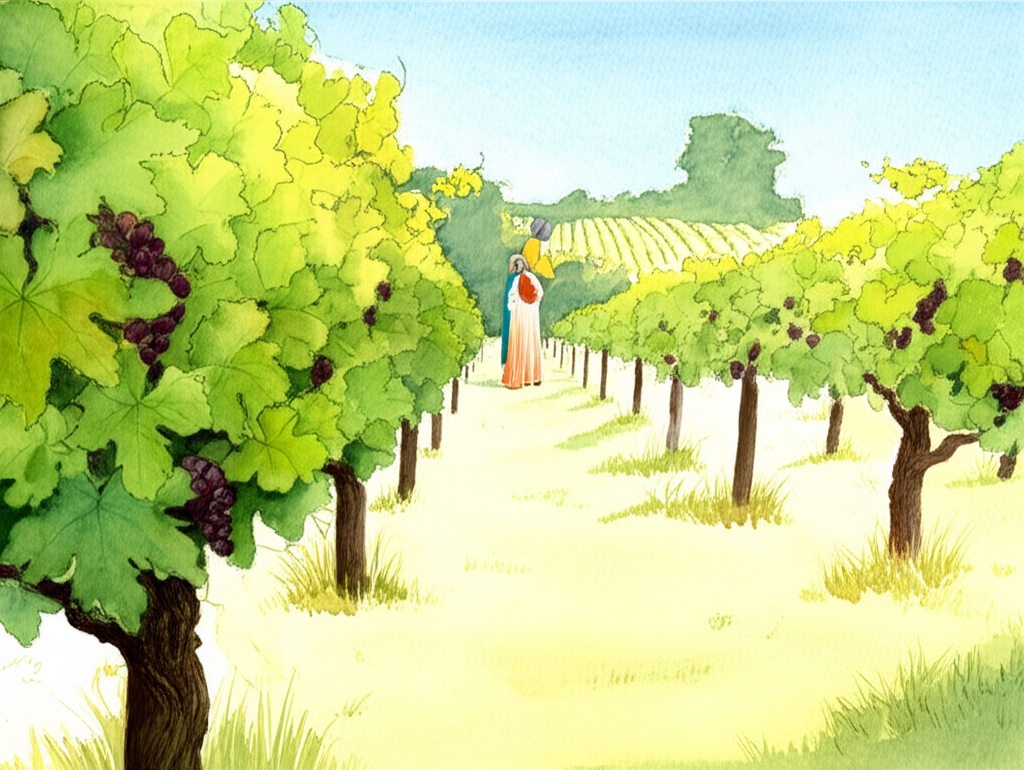Song Of Solomon 8 meaning explained in AI Summary
Chapter 8 of the Song of Solomon concludes the book with a passionate expression of love and desire. The woman expresses her longing for her beloved, comparing him to a seal upon her heart and a signet on her arm. She desires to be with him constantly, even if it means facing death.
The man responds by declaring his love for the woman and his desire to protect her. He compares their love to a powerful force that cannot be broken.
Meaning and Commentary
This final chapter reinforces the themes of love, desire, and the enduring power of a strong emotional connection. The imagery of seals and seals symbolizes the permanence and strength of their love.
- The Enduring Power of Love: The woman's declaration that she would rather die than be separated from her beloved emphasizes the enduring power of their love.
- The Protection of Love: The man's desire to protect the woman from harm highlights the protective and nurturing aspects of love.
- The Eternal Nature of Love: The imagery of seals and signets suggests that true love is a permanent and enduring force.
Overall, Chapter 8 of the Song of Solomon provides a powerful and moving conclusion to the book, celebrating the beauty and intensity of love in all its forms.
Song Of Solomon 8 bible study ai commentary
This chapter concludes the Song, moving from the courtship and wedding to the mature, enduring nature of love. It celebrates a love that is unashamed, strong as death, of divine origin, and priceless. The dialogue confirms the woman's strength of character and virtue, contrasting the free gift of love with commercial enterprise, and ends with a mutual longing for perpetual communion.
Song of Solomon 8 Context
The Song of Solomon is unique Wisdom Literature, using rich poetic dialogue to explore the beauty and power of romantic, monogamous love within a covenant relationship. Chapter 8 serves as the book's epilogue, offering a final reflection on the nature of this love after it has been tested and has matured. The cultural backdrop includes the strong role of the family, especially brothers, in safeguarding a sister's virginity and reputation. Agricultural metaphors, particularly the vineyard, are common in the Ancient Near East for a woman's sexuality, fertility, or more broadly, one's life and personal domain. The poem is set against the backdrop of King Solomon's reign, known for both great wisdom and great excess (including many foreign wives), creating a rich context for a poem that champions exclusive, covenantal love.
Song of Solomon 8:1-2
O that you were like a brother to me who nursed at my mother's breasts! If I found you outside, I would kiss you, and none would despise me. I would lead you and bring you into the house of my mother— she who used to teach me. I would give you spiced wine to drink, the juice of my pomegranates.
In-depth-analysis
- A Brother's Prerogative: The woman longs for the freedom to show affection publicly without shame. In that culture, romantic displays were private, but familial affection between siblings was acceptable. Her desire is not for an incestuous relationship but for an uninhibited, socially-sanctioned intimacy.
- Mother's House: This represents a place of safety, legitimacy, and intimacy. It is her domain, where she was taught and nurtured. Bringing him there signifies a complete and secure union, integrating him into the very foundation of her life.
- Spiced Wine and Pomegranates: Offering him her finest drink symbolizes giving her best. Pomegranates are ancient symbols of love, fertility, and blessing. She is offering the full fruit of her love and life to him.
- Word - lead you: Her initiative ('anahagacha) shows a mutuality and confidence in the relationship, not passive submission.
Bible references
- Hebrews 2:11: "...Jesus is not ashamed to call them brothers and sisters." (Christ's unashamed identification with His people, mirroring her desire).
- John 4:28-29: The Samaritan woman went... saying..."Come, see a man..." (Bringing others to the beloved in a public, unashamed way).
- Proverbs 9:2, 5: "She has prepared her meat and mixed her wine... 'Come, eat my food and drink the wine I have mixed.'" (Personified Wisdom inviting others to her feast, parallel to the woman's invitation).
Cross references
Gen 24:28 (Rebekah runs to her mother's house); Prov 7:17-18 (the adulteress offers spiced love, here it's offered in holiness); Rom 1:16 (not ashamed of the gospel); John 2:10 (Jesus provides the best wine).
Song of Solomon 8:3-4
His left hand is under my head, and his right hand embraces me! I charge you, O daughters of Jerusalem, do not stir up or awaken love until it pleases.
In-depth-analysis
- Familiar Refrain: This couplet repeats themes from earlier in the song (Song 2:6-7). Its reappearance here signifies a state of fulfilled rest, security, and consummated love. It’s a moment of complete contentment.
- The Final Charge: This is the third and final time this solemn warning is given. It underscores a central theme of the entire book: true love operates on a divine timetable. It is a sacred power that must not be manipulated, forced, or awakened prematurely. It must be allowed to grow and flourish according to its own nature.
Bible references
- Song of Solomon 2:6-7, 3:5: (The previous occurrences, marking key stages of longing and fulfillment).
- Galatians 4:4: "...when the fullness of time had come, God sent forth his Son..." (God's sovereign timing in His plan of salvation).
- Ecclesiastes 3:1: "For everything there is a season, and a time for every matter under heaven..." (The principle of proper timing in all things).
Cross references
Psa 27:14 (wait for the Lord); Psa 62:5 (my soul waits for God); Isa 28:16 (whoever believes will not be in haste).
Song of Solomon 8:5
Who is this coming up from the wilderness, leaning on her beloved? Under the apple tree I awakened you; there your mother was in labor with you, there she who bore you was in labor.
In-depth-analysis
- Wilderness Journey: The "wilderness" is a biblical motif for testing, purification, and preparation (e.g., Israel's 40 years). The couple emerges from this place, suggesting their love has been tested and has matured.
- Leaning on her Beloved: This posture signifies deep trust, dependency, and partnership. Their love is not one of self-sufficiency but mutual support. She finds her strength in him.
- Under the Apple Tree: The man speaks now, recalling the "awakening" of their love (echoing 2:3). He links the place of their romantic awakening to the place of her very birth ("there your mother was in labor"). This grounds their covenant love in the context of life, family, and origins, suggesting it is as fundamental as life itself.
Bible references
- Jeremiah 2:2: "I remember... how you followed me in the wilderness..." (God recalling Israel’s early devotion, a similar wilderness picture).
- Isaiah 40:3: "A voice cries: 'In the wilderness prepare the way of the Lord...'" (The wilderness as a place of new beginnings and divine revelation).
- Ephesians 5:28-29: "...he who loves his wife loves himself. For no one ever hated his own flesh, but nourishes and cherishes it, just as Christ does the church..." (The supportive, nurturing nature of Christ's love).
Cross references
Song 3:6 (an earlier "coming up from the wilderness"); Isa 63:9 (in all their affliction He was afflicted); John 15:5 (abiding in Christ).
Song of Solomon 8:6-7
Set me as a seal upon your heart, as a seal upon your arm, for love is strong as death, jealousy is fierce as the grave. Its flashes are flashes of fire, a very flame of the LORD. Many waters cannot quench love, neither can floods drown it. If a man offered for love all the wealth of his house, he would be utterly despised.
In-depth-analysis
- Seal upon Heart and Arm: A seal (khotam) was a cylinder or signet ring used to impress an owner’s mark, signifying ownership, security, value, and authority. She desires to be indelibly identified with him in his core being (heart) and his actions (arm).
- Strong as Death: Love is compared to the most irresistible, absolute force known in the Old Testament: Death (Mawet). No one escapes death; in the same way, true love is an unstoppable, all-encompassing power.
- Fierce as the Grave: "Jealousy" (qin'ah) is not petty envy but righteous, protective zeal for the exclusivity of the relationship. It is as tenacious and unyielding as the Grave (Sheol), which never gives up its dead.
- A Flame of the LORD: This is the theological climax. The Hebrew is shalhevetyah, a unique word construction combining "flame" with Yah (a short form of Yahweh). It explicitly states that this powerful love is not merely a human emotion; it has its source in God Himself. It is a spark of divine fire.
- Unquenchable and Priceless: Love is presented as invincible against all opposition (chaos waters) and beyond all monetary value. It cannot be bought or sold. To attempt to do so is to misunderstand its sacred nature completely.
Bible references
- Romans 8:38-39: "...neither death nor life... will be able to separate us from the love of God in Christ Jesus our Lord." (The ultimate NT statement on the unquenchable power of God's love).
- Ephesians 1:13-14: "...you were sealed with the promised Holy Spirit, who is the guarantee of our inheritance..." (The "seal" metaphor fulfilled in the Spirit's work of securing believers for God).
- Exodus 20:5: "You shall not bow down to them or serve them, for I the LORD your God am a jealous God..." (God's qin'ah is a holy zeal for His covenant people).
Cross references
Jer 22:24 (signet ring metaphor); Hag 2:23 (God choosing Zerubbabel as a signet ring); 1 Cor 13:4-8 (love's enduring character); Rev 22:17 (the bride's desire for the groom).
Polemics
This passage is a direct polemic against the transactional views of love and sex in Canaanite and Mesopotamian fertility religions. Those cults treated love as a cosmic force to be manipulated through ritual. The Song declares that true, covenantal love is personal, exclusive, priceless, and originates solely with Yahweh, the one true God.
Song of Solomon 8:8-9
We have a little sister, and she has no breasts. What shall we do for our sister on the day when she is spoken for? If she is a wall, we will build on her a battlement of silver. If she is a door, we will enclose her with boards of cedar.
In-depth-analysis
- The Brothers' Voice: This is likely a flashback to the woman's youth. Her brothers are discussing their protective duty. "Little sister" with "no breasts" is a metaphor for her sexual immaturity.
- Wall vs. Door Metaphor:
- A Wall: Represents chastity, integrity, and moral strength. A girl who is a "wall" is steadfast and guards her purity. Her family will honor and adorn her ("battlement of silver").
- A Door: Represents someone who is vulnerable, easily opened, or morally permissive. Her family would need to protect and restrict her ("enclose her with boards of cedar") to guard her reputation and future.
- This dialogue highlights the cultural value placed on female virginity before marriage and the family's role in upholding it.
Bible references
- 2 Corinthians 11:2: "I feel a divine jealousy for you, since I betrothed you to one husband, to present you as a pure virgin to Christ." (Paul’s pastoral concern for the purity of the church).
- 1 Corinthians 7:36-37: "If anyone thinks that he is not behaving properly toward his virgin... But whoever is firmly established in his heart... to keep her as his virgin, does well." (Paul's instruction on a father's guardianship).
- Proverbs 4:23: "Keep your heart with all vigilance, for from it flow the springs of life." (The underlying principle of guarding one's moral core).
Cross references
Eze 16:7 (metaphor of Israel's immaturity); Prov 25:28 (a man without self-control is like a city broken into); Prov 31:10 (the value of a virtuous woman).
Song of Solomon 8:10
I am a wall, and my breasts are like towers; then I was in his eyes as one who finds peace.
In-depth-analysis
- Her Response: The woman proudly responds to her brothers' past concerns. She declares, "I am a wall." She took responsibility for her own integrity.
- Breasts like Towers: In contrast to having "no breasts," she is now mature and strong ("towers"). Her virtue is not fragile but formidable.
- Finds Peace: The Hebrew word for "peace" is shalom, which means wholeness, well-being, and favor. It is also a wordplay on her beloved's name, Solomon (Shlomo). Because of her strength of character, she found shalom in the eyes of her Shlomo. She was a source of peace and completeness for him, not trouble.
Bible references
- Proverbs 31:10-11: "An excellent wife who can find? She is far more precious than jewels. The heart of her husband trusts in her, and he will have no lack of gain." (Her character is the source of her husband's trust and gain).
- Luke 1:30: "And the angel said to her, 'Do not be afraid, Mary, for you have found favor with God.'" (Favor found as a result of one's standing before God).
Cross references
Esth 2:15-17 (Esther found favor); Psa 85:10 (righteousness and peace kiss).
Song of Solomon 8:11-12
Solomon had a vineyard at Baal-hamon; he let out the vineyard to keepers; each one was to bring for its fruit a thousand pieces of silver. My vineyard, my very own, is before me; you, O Solomon, may have the thousand, and the keepers of the fruit two hundred.
In-depth-analysis
- Two Vineyards: The woman contrasts two economic models of "vineyards."
- Solomon's Vineyard: Located at "Baal-hamon" (lord of a multitude), it represents a vast, impersonal, commercial enterprise run for profit. It is leased out.
- Her Vineyard: This is her life, her love, her very self. It is "my very own." It is not for lease or for sale.
- A Freely Given Gift: While Solomon's tenants had to pay him a thousand shekels, she freely gives the "thousand" (the full value) to her beloved, Solomon.
- Honoring the Keepers: She also allocates "two hundred" to the "keepers"—likely her brothers who guarded her. She acknowledges and rewards their protective care.
- The contrast is central: His love is not a commercial transaction to be paid for, but a priceless gift to be freely given. This stands as a subtle critique of the historical Solomon's acquisitiveness.
Bible references
- Isaiah 5:1-7: "Let me sing for my beloved my love song concerning his vineyard..." (The famous parable where God is the owner of the vineyard, Israel, who owes him good fruit).
- Matthew 21:33-41: The Parable of the Tenants, where renters refuse to give the owner the fruit. (In contrast, she gives the fruit of her vineyard freely).
- 1 Corinthians 6:19-20: "Or do you not know that your body is a temple of the Holy Spirit... you are not your own, for you were bought with a price." (Our lives are God's, yet we are called to freely offer ourselves back to him).
Cross references
Gen 30:25-34 (Jacob negotiating wages with Laban); Mat 13:44-46 (Parable of Pearl of Great Price).
Song of Solomon 8:13-14
O you who dwell in the gardens, companions are listening for your voice; let me hear it. Make haste, my beloved, and be like a gazelle or a young stag on the mountains of spices.
In-depth-analysis
- His Request: The beloved speaks first. He pictures her in "the gardens"—a place of beauty, intimacy, and delight (like Eden). Her "companions" (the community) are listening, attesting to the public beauty of their relationship. But his request is personal: "let me hear it." He longs for her voice, directed to him alone.
- Her Response: Her final words in the book are an eager, urgent invitation. "Make haste, my beloved!"
- Mountains of Spices: This is a crucial modification of her earlier cry in 2:17, which mentioned the "mountains of Bether" (separation). The journey is no longer over mountains of separation but "mountains of spices"—fragrant, delightful, and inviting. The barriers are gone.
- An Unending Song: The book does not end with "and they lived happily ever after." It ends on a note of mutual, active longing and joyful anticipation of continued communion. Love is not a static state but a dynamic, ongoing relationship.
Bible references
- Revelation 22:17, 20: "The Spirit and the Bride say, 'Come.'... 'Surely I am coming soon.' Amen. Come, Lord Jesus!" (The final words of the Bible are an almost identical cry of longing from the Bride (Church) for her Groom (Christ)).
- John 10:27: "My sheep hear my voice, and I know them, and they follow me." (The intimate recognition between the Shepherd and his sheep).
- 2 Timothy 4:8: "...the crown of righteousness, which the Lord...will award to me on that day, and not only to me but also to all who have loved his appearing." (The eager longing for the Lord's return).
Cross references
Song 2:17 (the earlier call over mountains of separation); Psa 45:8 (garments scented with spices).
Song of Solomon chapter 8 analysis
- Typological Fulfillment: The entire chapter finds its ultimate theological echo in the relationship between Christ and the Church.
- The Unashamed Brother (v.1): Fulfilled in Hebrews 2:11, where Jesus is not ashamed to call believers His brothers and sisters.
- The Seal of God (v.6): Fulfilled in the Holy Spirit, who seals believers as God's treasured possession (Eph 1:13).
- The Flame of Yahweh (v.6): God's love for His people is the ultimate source of all true love, a holy fire that cannot be extinguished (Rom 8:35-39).
- The Priceless Love (v.7): Salvation is a free gift of grace that cannot be earned or bought with any human merit (Eph 2:8-9).
- The Final Cry (v.14): The bride's urgent "Make haste!" is perfectly mirrored in the Church's final cry, "Come, Lord Jesus!" in Revelation 22:20.
- The Final Word is Hers: It is significant that the Shulamite woman gets the last word in the book. It gives a final emphasis on the mutuality, equality, and active participation within the relationship, subverting a purely patriarchal reading.
- Critique of Solomon: The book uses "Solomon" as both the beloved king and a foil. The love celebrated is monogamous, personal, and priceless (8:7, 12), a stark contrast to the historical Solomon's polygamy (1 Kings 11:3) and vast, commercialized wealth. The Song presents an ideal love that even the great King Solomon couldn't buy.
Song of Solomon 8 summary
Chapter 8 brings the Song to its thematic peak, celebrating a mature love that is publicly unashamed, rooted in a shared history, and rests in deep security. It famously defines this love as a divine force—"a very flame of the LORD"—that is as strong as death, fiercely exclusive, unquenchable, and utterly priceless. The woman confirms her own virtue and contrasts her freely-given love with Solomon's commercial ventures. The book concludes not with a final resolution, but with an open-ended, eager call for perpetual and swift communion, mirroring the eternal anticipation between a bride and groom.
Song Of Solomon 8 AI Image Audio and Video









Song Of Solomon chapter 8 kjv
- 1 O that thou wert as my brother, that sucked the breasts of my mother! when I should find thee without, I would kiss thee; yea, I should not be despised.
- 2 I would lead thee, and bring thee into my mother's house, who would instruct me: I would cause thee to drink of spiced wine of the juice of my pomegranate.
- 3 His left hand should be under my head, and his right hand should embrace me.
- 4 I charge you, O daughters of Jerusalem, that ye stir not up, nor awake my love, until he please.
- 5 Who is this that cometh up from the wilderness, leaning upon her beloved? I raised thee up under the apple tree: there thy mother brought thee forth: there she brought thee forth that bare thee.
- 6 Set me as a seal upon thine heart, as a seal upon thine arm: for love is strong as death; jealousy is cruel as the grave: the coals thereof are coals of fire, which hath a most vehement flame.
- 7 Many waters cannot quench love, neither can the floods drown it: if a man would give all the substance of his house for love, it would utterly be contemned.
- 8 We have a little sister, and she hath no breasts: what shall we do for our sister in the day when she shall be spoken for?
- 9 If she be a wall, we will build upon her a palace of silver: and if she be a door, we will inclose her with boards of cedar.
- 10 I am a wall, and my breasts like towers: then was I in his eyes as one that found favour.
- 11 Solomon had a vineyard at Baalhamon; he let out the vineyard unto keepers; every one for the fruit thereof was to bring a thousand pieces of silver.
- 12 My vineyard, which is mine, is before me: thou, O Solomon, must have a thousand, and those that keep the fruit thereof two hundred.
- 13 Thou that dwellest in the gardens, the companions hearken to thy voice: cause me to hear it.
- 14 Make haste, my beloved, and be thou like to a roe or to a young hart upon the mountains of spices.
Song Of Solomon chapter 8 nkjv
- 1 Oh, that you were like my brother, Who nursed at my mother's breasts! If I should find you outside, I would kiss you; I would not be despised.
- 2 I would lead you and bring you Into the house of my mother, She who used to instruct me. I would cause you to drink of spiced wine, Of the juice of my pomegranate.
- 3 His left hand is under my head, And his right hand embraces me.
- 4 I charge you, O daughters of Jerusalem, Do not stir up nor awaken love Until it pleases.
- 5 Who is this coming up from the wilderness, Leaning upon her beloved? I awakened you under the apple tree. There your mother brought you forth; There she who bore you brought you forth.
- 6 Set me as a seal upon your heart, As a seal upon your arm; For love is as strong as death, Jealousy as cruel as the grave; Its flames are flames of fire, A most vehement flame.
- 7 Many waters cannot quench love, Nor can the floods drown it. If a man would give for love All the wealth of his house, It would be utterly despised.
- 8 We have a little sister, And she has no breasts. What shall we do for our sister In the day when she is spoken for?
- 9 If she is a wall, We will build upon her A battlement of silver; And if she is a door, We will enclose her With boards of cedar.
- 10 I am a wall, And my breasts like towers; Then I became in his eyes As one who found peace.
- 11 Solomon had a vineyard at Baal Hamon; He leased the vineyard to keepers; Everyone was to bring for its fruit A thousand silver coins.
- 12 My own vineyard is before me. You, O Solomon, may have a thousand, And those who tend its fruit two hundred.
- 13 You who dwell in the gardens, The companions listen for your voice? Let me hear it!
- 14 Make haste, my beloved, And be like a gazelle Or a young stag On the mountains of spices.
Song Of Solomon chapter 8 niv
- 1 If only you were to me like a brother, who was nursed at my mother's breasts! Then, if I found you outside, I would kiss you, and no one would despise me.
- 2 I would lead you and bring you to my mother's house? she who has taught me. I would give you spiced wine to drink, the nectar of my pomegranates.
- 3 His left arm is under my head and his right arm embraces me.
- 4 Daughters of Jerusalem, I charge you: Do not arouse or awaken love until it so desires.
- 5 Who is this coming up from the wilderness leaning on her beloved? Under the apple tree I roused you; there your mother conceived you, there she who was in labor gave you birth.
- 6 Place me like a seal over your heart, like a seal on your arm; for love is as strong as death, its jealousy unyielding as the grave. It burns like blazing fire, like a mighty flame.
- 7 Many waters cannot quench love; rivers cannot sweep it away. If one were to give all the wealth of one's house for love, it would be utterly scorned.
- 8 We have a little sister, and her breasts are not yet grown. What shall we do for our sister on the day she is spoken for?
- 9 If she is a wall, we will build towers of silver on her. If she is a door, we will enclose her with panels of cedar.
- 10 I am a wall, and my breasts are like towers. Thus I have become in his eyes like one bringing contentment.
- 11 Solomon had a vineyard in Baal Hamon; he let out his vineyard to tenants. Each was to bring for its fruit a thousand shekels of silver.
- 12 But my own vineyard is mine to give; the thousand shekels are for you, Solomon, and two hundred are for those who tend its fruit.
- 13 You who dwell in the gardens with friends in attendance, let me hear your voice!
- 14 Come away, my beloved, and be like a gazelle or like a young stag on the spice-laden mountains.
Song Of Solomon chapter 8 esv
- 1 Oh that you were like a brother to me who nursed at my mother's breasts! If I found you outside, I would kiss you, and none would despise me.
- 2 I would lead you and bring you into the house of my mother ? she who used to teach me. I would give you spiced wine to drink, the juice of my pomegranate.
- 3 His left hand is under my head, and his right hand embraces me!
- 4 I adjure you, O daughters of Jerusalem, that you not stir up or awaken love until it pleases.
- 5 Who is that coming up from the wilderness, leaning on her beloved? Under the apple tree I awakened you. There your mother was in labor with you; there she who bore you was in labor.
- 6 Set me as a seal upon your heart, as a seal upon your arm, for love is strong as death, jealousy is fierce as the grave. Its flashes are flashes of fire, the very flame of the LORD.
- 7 Many waters cannot quench love, neither can floods drown it. If a man offered for love all the wealth of his house, he would be utterly despised.
- 8 We have a little sister, and she has no breasts. What shall we do for our sister on the day when she is spoken for?
- 9 If she is a wall, we will build on her a battlement of silver, but if she is a door, we will enclose her with boards of cedar.
- 10 I was a wall, and my breasts were like towers; then I was in his eyes as one who finds peace.
- 11 Solomon had a vineyard at Baal-hamon; he let out the vineyard to keepers; each one was to bring for its fruit a thousand pieces of silver.
- 12 My vineyard, my very own, is before me; you, O Solomon, may have the thousand, and the keepers of the fruit two hundred.
- 13 O you who dwell in the gardens, with companions listening for your voice; let me hear it.
- 14 Make haste, my beloved, and be like a gazelle or a young stag on the mountains of spices.
Song Of Solomon chapter 8 nlt
- 1 Oh, I wish you were my brother,
who nursed at my mother's breasts.
Then I could kiss you no matter who was watching,
and no one would criticize me. - 2 I would bring you to my childhood home,
and there you would teach me.
I would give you spiced wine to drink,
my sweet pomegranate wine. - 3 Your left arm would be under my head,
and your right arm would embrace me. - 4 Promise me, O women of Jerusalem,
not to awaken love until the time is right. - 5 Who is this sweeping in from the desert,
leaning on her lover? Young Woman
I aroused you under the apple tree,
where your mother gave you birth,
where in great pain she delivered you. - 6 Place me like a seal over your heart,
like a seal on your arm.
For love is as strong as death,
its jealousy as enduring as the grave.
Love flashes like fire,
the brightest kind of flame. - 7 Many waters cannot quench love,
nor can rivers drown it.
If a man tried to buy love
with all his wealth,
his offer would be utterly scorned. - 8 We have a little sister
too young to have breasts.
What will we do for our sister
if someone asks to marry her? - 9 If she is a virgin, like a wall,
we will protect her with a silver tower.
But if she is promiscuous, like a swinging door,
we will block her door with a cedar bar. - 10 I was a virgin, like a wall;
now my breasts are like towers.
When my lover looks at me,
he is delighted with what he sees. - 11 Solomon has a vineyard at Baal-hamon,
which he leases out to tenant farmers.
Each of them pays a thousand pieces of silver
for harvesting its fruit. - 12 But my vineyard is mine to give,
and Solomon need not pay a thousand pieces of silver.
But I will give two hundred pieces
to those who care for its vines. - 13 O my darling, lingering in the gardens,
your companions are fortunate to hear your voice.
Let me hear it, too! - 14 Come away, my love! Be like a gazelle
or a young stag on the mountains of spices.
- Bible Book of Song Of Solomon
- 1 The Bride Confesses Her Love
- 2 The Bride Adores Her Beloved
- 3 The Bride's Dream
- 4 Solomon Admires His Bride's Beauty
- 5 The Bride Searches for Her Beloved
- 6 Together in the Garden of Love
- 7 The Bride Gives Her Love
- 8 Longing for Her Beloved